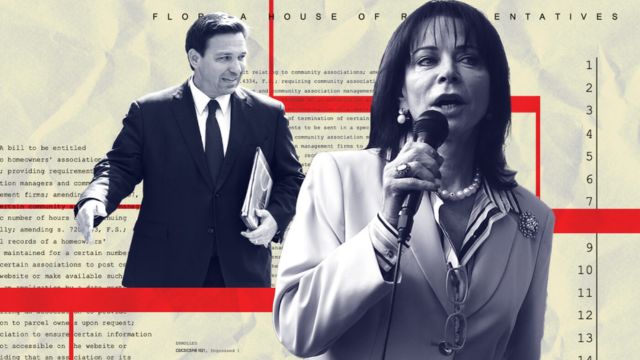Florida Takes Action Now, Legislature Boosts Penalties for Community Association Fraud
DEBARYLIFE – The Florida Legislature has enacted two legislation to tighten criminal penalties for association fraud and malfeasance in response to situations like the alleged theft of more than $4 million at the Hammocks HOA in Kendall and the arrests of four of its former board members and one of their spouses.
The legislation is currently awaiting Governor Ron DeSantis’ final approval after passing both chambers of the legislature by unanimous vote.
The identical severe criminal punishments are imposed by both legislation for various infractions. Intentionally damaging and destroying accounting records, as well as failing to generate and maintain them with bad purpose, are now considered first-degree misdemeanors.
Additionally, they stipulate that anyone who “willfully and knowingly refuses to release or otherwise produce association records with the intent to avoid or escape detection, arrest, trial, or punishment for the commission of a crime, or to assist another person with such avoidance,” will be charged with third-degree felonies.
Board members and property managers who fail to provide requested records or maintain them for seven years will also be charged with second-degree misdemeanors. Property managers or board members who request or accept bribes may also be charged with a third-degree felony.
SEE MORE: Miami-Dade Officer Avoids DUI Probe Despite Witness Allegations of Impairment
According to the new law, homeowners associations must provide records that are subject to a subpoena within five business days and, to the extent permitted by law, aid law enforcement in their investigations.

A state-approved instructional course on financial literacy and transparency, fines, recordkeeping, and meeting notices will be mandatory for HOA board members. In HOAs with fewer than 2,500 houses, directors are required to complete four hours of continuing education each year; in communities with more than 2,500 homes, they must complete eight hours.
Homeowners associations are required to keep official documents for a minimum of seven years. These records may include minutes from meetings, contracts with vendors, election results, financial and tax information, and more. Many of the records of those who own at least 100 houses must be posted on a community website, along with meeting announcements and agendas for all open board meetings, at least 14 days in advance. Contracts that are put to a vote during a meeting must be announced at least seven days beforehand.
For certain minor rule infractions, HOAs will not be permitted to suspend voting privileges or access to community facilities. Furthermore, liens against homeowners for relatively small fines will need the consent of seventy-five percent of the owners; additionally, certain fines for specific traffic and landscaping violations are not eligible to become liens.
For homeowners associations, special assessments are limited to five percent of the yearly budgeted expenses, unless approved by sixty percent of voting members. Regular assessments, which do not include insurance, are only allowed to increase by ten percent over the previous year. Additionally, compound interest on past-due assessments is not permitted by HOAs.
Additionally, election fraud in condominium organizations is covered by the new law. First-degree offenses will be charged against anyone who restricts owners from voting, uses threats to sway a vote, purchases votes, or assists in voter fraud.
SEE MORE: California Trio Accused of Robbing Low-Income Families and EBT Recipients
Directors of condominium associations who are accused of crimes like falsifying ballots, embezzling association funds, obstructing the course of justice, and destroying records are to be removed from their positions. In addition to completing an hour of continuing education every year of service, all condominium directors will be required to complete a four-hour course covering structural inspections, reserves, elections, recordkeeping, fines, meetings, budgets/financing, records transparency, and other matters.
When a client association fires a condominium association’s property manager or management company, they have twenty days to turn over all of the records they own. If they don’t, they risk losing their state license and paying fines of $1,000 every day.

The state Department of Business and Professional Regulation is required to compile a list of associations that have finished their newly required structural integrity reserve studies into a database on its website by the beginning of 2025. Associations must notify the DBPR and give a copy of the research to each owner within 45 days after its completion.
The new law gives the DBPR $7.4 million and 65 full-time staff members, totaling $3.2 million in salary, in this year’s state budget to carry out and police the new regulations.
Legislative action was necessary in response to reports of blatant thefts and fraud at Florida HOAs and condominium organizations, and the fact that both of these laws were passed by both chambers with unanimous votes indicates that the issue is now a top concern for the state’s legislators. After the measures are signed into law by Governor DeSantis, they will go into effect on July 1.











